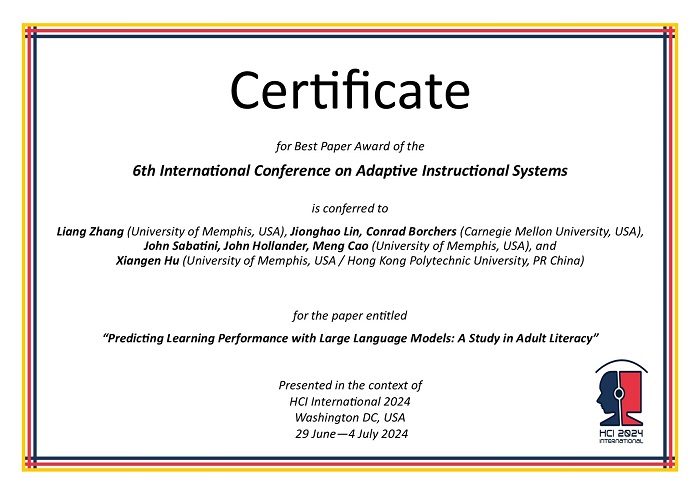
The Best Paper Award of the 6th International Conference on Adaptive Instructional Systems
has been conferred to
Liang Zhang (University of Memphis, USA),
Jionghao Lin, Conrad Borchers (Carnegie Mellon University, USA),
John Sabatini, John Hollander, Meng Cao (University of Memphis, USA),
and Xiangen Hu (University of Memphis, USA / Hong Kong Polytechnic University, PR China)
for the paper entitled
"Predicting Learning Performance with Large Language Models: A Study in Adult Literacy"

Liang Zhang
(presenter)

Best Paper Award for the 6th International Conference on Adaptive Instructional Systems, in the context of HCI International 2024, Washington DC, USA, 29 June - 4 July 2024

Certificate for Best Paper Award of the 6th International Conference on Adaptive Instructional Systems presented in the context of HCI International 2024, Washington DC, USA, 29 June - 4 July 2024
Paper Abstract
Intelligent Tutoring Systems (ITSs) have significantly enhanced adult literacy training, a key factor for societal participation, employment opportunities, and lifelong learning. Our study investigates the application of advanced AI models, including Large Language Models (LLMs) like GPT-4, for predicting learning performance in adult literacy programs in ITSs. This research is motivated by the potential of LLMs to predict learning performance based on its inherent reasoning and computational capabilities. By using reading comprehension datasets from the ITS, AutoTutor, we evaluate the predictive capabilities of GPT-4 versus traditional machine learning methods in predicting learning performance through five-fold cross-validation techniques. Our findings show that the GPT-4 presents the competitive predictive abilities with traditional machine learning methods such as Bayesian Knowledge Tracing, Performance Factor Analysis, Sparse Factor Analysis Lite (SPARFA-Lite), tensor factorization and eXtreme Gradient Boosting (XGBoost). While XGBoost (trained on local machine) outperforms GPT-4 in predictive accuracy, GPT-4-selected XGBoost and its subsequent tuning on the GPT-4 platform demonstrates superior performance compared to local machine execution. Moreover, our investigation into hyper-parameter tuning by GPT-4 versus grid-search suggests comparable performance, albeit with less stability in the automated approach, using XGBoost as the case study. Our study contributes to the field by highlighting the potential of integrating LLMs with traditional machine learning models to enhance predictive accuracy and personalize adult literacy education, setting a foundation for future research in applying LLMs within ITSs.
The full paper is available through SpringerLink, provided that you have proper access rights.